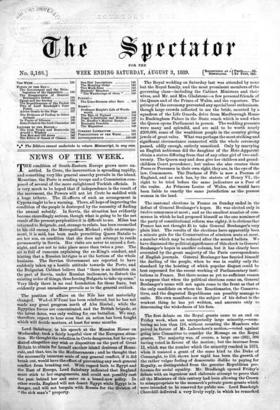The cantonal elections in France on Sunday ended in the
defeat of General Boulanger's hopes. He was elected only in twelve communes at most; and as the smallest number of com- munes in which he had proposed himself as the one nominee of the party of constitutional reform was eighty, it is obvious that France has not thought fit to take General Boulanger's very plain hint. The results of the elections have apparently been a minute gain for the Conservatives of nineteen seats at most, a number which may be reduced after the second ballots. We have discussed the political significance of this check to General Boulanger's hopes in another column, but it has clearly been overrated by the great majority of the Paris correspondents of English journals. General Boulanger has fancied himself the darling of the people, when he was in reality only the standard by the hoisting of which popular disgust could be best expressed for the recent working of Parliamentary insti- tutions in France. But there seems as yet no sufficient reason to suppose that when the political elections come on, General Boulanger's name will not again come to the front as that of the only candidate on whom the Reactionaries, the Conserva- tives, and the disgusted Republicans can possibly manage to unite. His own manifesto on the subject of his defeat is the weakest thing he has yet written, and amounts only to denouncing the wickedness of his foes.


































